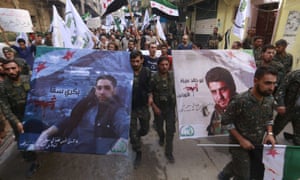
'Until now Iran had tried to avoid a public show of its role in the war, fearing that it would be portrayed as a Shia invasion force, amplifying already febrile sectarian tensions. Mohammed al-Sheikh, a senior member of an FSA-aligned unit called Division 1, said: “We know that, if the Iranians bomb us, it would be the start of the third world war. Everyone from the Arab world would come and join us, because it would be a Persian attack on Syria. This is why the regime has played it smartly, by bringing in the Russians.
For the regime, Aleppo is the economic hub. If we lose Aleppo, it doesn’t mean we lose the war, it means we lost a phase. Our friends understand the gravity of the situation, but their hands are tied by politics and international agreements. We are the Syrians who are losing on a daily basis because of these politics. If we look at who has what in Syria, you will see that Isis is only controlling the desert, and it is worthless. Yes, they have oil and water, but now we are controlling the core of Syria and that’s why the regime is crying for help.”
“We are confused about the Americans,” said Malafji. “We can only see the Americans active near the Kurdish areas, but not anywhere else.” From a base in Aleppo’s southeast, not far from the city’s airport that is still used by the regime, Abdur Rahman, a long-term member of an Islamist unit, said: “We used to dream about the sound of F-16s. But for us it’s just the Syrian planes, and the deeper roar of the Russian jets. That’s our fate.” '

